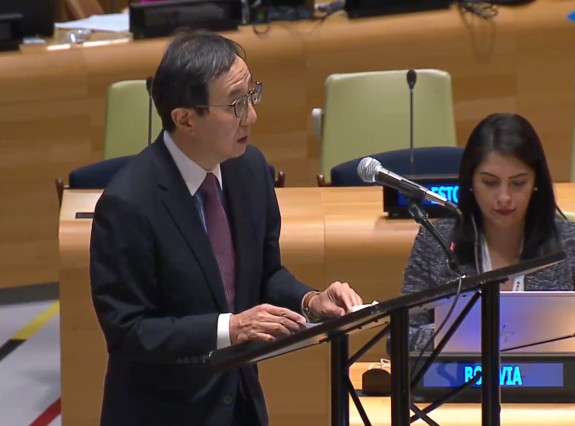Statement by H.E. Ambassador YAMAZAKI Kazuyuki, Permanent Representative of Japan to the United Nations, at the High-level Plenary Meeting to Commemorate and Promote the International Day for the Total Elimination of Nuclear Weapons
2024/9/26

(As delivered)
Mr. President,
Let me express my appreciation to you for convening us on this important day.
The pathway to a world without nuclear weapons is getting tougher in recent times, but just days ago we renewed our commitment to advancing that goal in the Pact for the Future. We must persistently pursue realistic and practical initiatives.
It is imperative to maintain and strengthen the NPT regime, as the cornerstone of global nuclear non-proliferation and disarmament. The 2026 NPT Review Conference is the touchstone for us. Japan welcomes the Chair’s summary issued at the second Preparatory Committee meeting and looks forward to the third meeting.
We have to ensure a downward trend of the global number of nuclear weapons. Japan has been emphasizing the necessity of the immediate start of FMCT negotiations. This week, Prime Minister Kishida launched the FMCT Friends Group together with eleven like-minded countries to build momentum.
The CTBT is getting closer to universalization, but Russia withdrew its ratification, and the Treaty still has not entered into force. The Friends of the CTBT and endorsing Member States issued a joint statement this week, urging all States that have not already done so, particularly Annex 2 States, to sign and ratify the Treaty.
As imminent issues, we need to address Russia's threat of use of nuclear weapons, as well as the advancement of North Korea's nuclear development and missile activities while enhancing its relationship with Russia. Iran’s nuclear issue also continues to be a global concern.
Mr. President,
As the only country to have ever suffered atomic bombings, Japan considers it our mission to convey the realities of nuclear weapons use to the world.
Next year marks 80 years since the atomic bombings of Hiroshima and Nagasaki. Japan will further strengthen its initiatives focusing on three pillars: first, sending survivors of the atomic bombs, the Hibakusha, and youth overseas; second, promoting visits to Hiroshima and Nagasaki; and third, strengthening communication internationally.
Mr. President,
Finally, I wish to touch on the ALPS treated water at the Fukushima Daiichi Nuclear Power Station. Let me reiterate that Japan has never discharged the treated water into the sea in a way that endangers human health and the marine environment. Japan will continue to share the results in a transparent manner and in good faith through monitoring by Japan and the IAEA involving interested third parties.
I thank you.
Let me express my appreciation to you for convening us on this important day.
The pathway to a world without nuclear weapons is getting tougher in recent times, but just days ago we renewed our commitment to advancing that goal in the Pact for the Future. We must persistently pursue realistic and practical initiatives.
It is imperative to maintain and strengthen the NPT regime, as the cornerstone of global nuclear non-proliferation and disarmament. The 2026 NPT Review Conference is the touchstone for us. Japan welcomes the Chair’s summary issued at the second Preparatory Committee meeting and looks forward to the third meeting.
We have to ensure a downward trend of the global number of nuclear weapons. Japan has been emphasizing the necessity of the immediate start of FMCT negotiations. This week, Prime Minister Kishida launched the FMCT Friends Group together with eleven like-minded countries to build momentum.
The CTBT is getting closer to universalization, but Russia withdrew its ratification, and the Treaty still has not entered into force. The Friends of the CTBT and endorsing Member States issued a joint statement this week, urging all States that have not already done so, particularly Annex 2 States, to sign and ratify the Treaty.
As imminent issues, we need to address Russia's threat of use of nuclear weapons, as well as the advancement of North Korea's nuclear development and missile activities while enhancing its relationship with Russia. Iran’s nuclear issue also continues to be a global concern.
Mr. President,
As the only country to have ever suffered atomic bombings, Japan considers it our mission to convey the realities of nuclear weapons use to the world.
Next year marks 80 years since the atomic bombings of Hiroshima and Nagasaki. Japan will further strengthen its initiatives focusing on three pillars: first, sending survivors of the atomic bombs, the Hibakusha, and youth overseas; second, promoting visits to Hiroshima and Nagasaki; and third, strengthening communication internationally.
Mr. President,
Finally, I wish to touch on the ALPS treated water at the Fukushima Daiichi Nuclear Power Station. Let me reiterate that Japan has never discharged the treated water into the sea in a way that endangers human health and the marine environment. Japan will continue to share the results in a transparent manner and in good faith through monitoring by Japan and the IAEA involving interested third parties.
I thank you.
